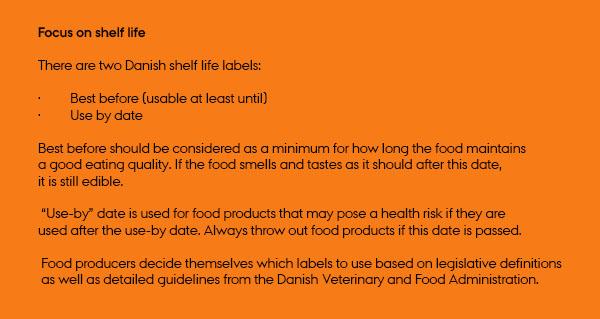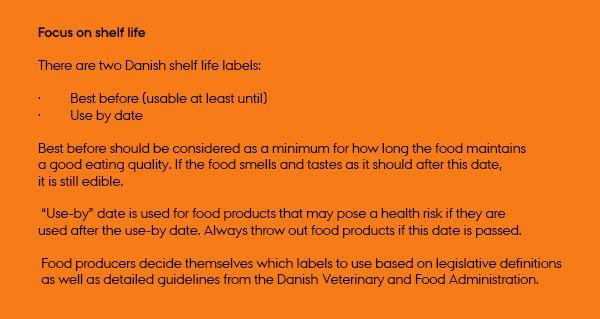
"Best before", "usable at least until" and "expiry date" – those are the Danish shelf life labels used in connection with food. In 2012 a study examined whether the Danes knew the difference between these labels, and in 2015 scientists from Aarhus University examined if our knowledge of the labels has improved and if we are able to distinguish between them.
Further, the scientists examined whether we trust our senses when it comes to finding out if the food is still edible or should be thrown away. Professor Liisa Lähteenmäki from Department of Management at Aarhus University is one of the authors of a new report outlining the results of the new studies. She explains:
– We were rather eager to see if the major focus on food waste in recent years would change how the Danes act in relation to food shelf life.
Reduced food waste
In order to reduce food waste it is an advantage to check the quality of food by looking at it, smelling or tasting it before it is discarded. On the other hand taking a big bite may be a potential health risk when it comes to perishable foods that have passed the "use-by" date.
It is important that consumers know the different meanings of the labels. Products labelled "best before" or "usable at least until" may be eaten after the expiry date if the sensory quality is acceptable. As for products labelled "use-by" consumers should be aware of the label and discard the food once the date has passed.
Even if the product seems fine and smells good it may pose a potential health risk. In general, the knowledge of food labels had improved in 2015 when compared to the 2012 study.
However, the increase in knowledge was rather modest. The modest increase is probably partly due to the fact that consumers already had a relatively high knowledge of the labels in the 2012 study. Approx. 70 percent of the participants in the 2015 study answered the questions in relation to the labels correctly.
Today, however, it is obvious that food waste plays an increasing role in consumer awareness. The new study clearly demonstrated that significantly more consumers know that food labelled "best before" does not constitute a health risk even though the date has expired.
Too much food is still thrown away
However, food waste is still a problem. The study demonstrated that between 10 and 42 percent of the respondents, depending on the product category throw away food that might be eaten after the "best before" date without even checking if the food is still edible.
Trust in our abilities to assess whether the food is in condition varies between products. We often check bread before it is thrown out, but fewer of us taste yoghurt to see if it is edible 3-4 days after the date.
Our senses – and the degree to which we trust them – also play a decisive role when it comes to displaying risk behavior and taste the food after the "use by" date. Older study participants and those who trusted their senses were more likely to display risk behavior and taste food that should actually be thrown away after the expiry date.
– Consumers trust their senses, and this is good in relation to some food products as it helps us reduce food waste. However, it may also be a disadvantage concerning other types of food as it may pose a health risk. The same behavior may thus be good in some cases but rather unsuitable in others, says Liisa Lähteenmäki.
###
Further information
Professor Liisa Lähteenmäki
Department of Management
Mail: [email protected]
Tel.: +45 8716 5143 or 5149 0930
The DCA report "Holdbarhedsmærkning på Fødevarer, forståelse blandt forbrugere" has been commissioned and funded by the Ministry of Environment and Food of Denmark as part of the agreement with Aarhus University on the provision of research-based policy support.
Download here (in Danish): http://web.agrsci.dk/djfpublikation/index.asp?action=show&id=1217
Media Contact
Liisa Lähteenmäki
[email protected]
45-87-16-51-43
@aarhusuni
http://www.au.dk





